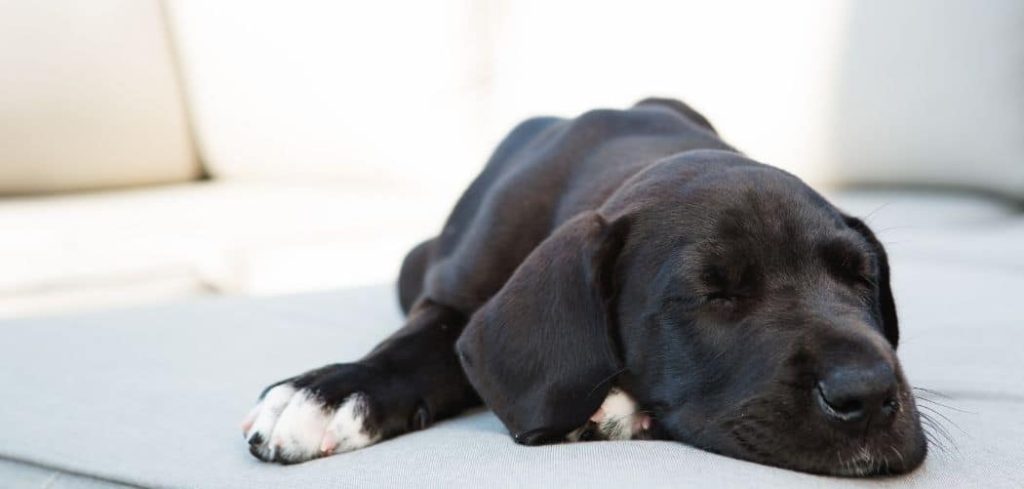It can be worrying to see an older dog panting excessively at night, especially when they seem restless and uncomfortable.
Nighttime panting may point to underlying health problems or environmental factors that deserve attention.
We outline the common reasons why an old dog may excessively pant at night, what you can do at home, and when to seek veterinary help.
Old Dog Panting Excessively at Night — Why It Happens
Excessive nighttime panting in older dogs is often linked to medical issues, stress, or environmental discomfort. Heart disease, arthritis pain, respiratory problems, cognitive decline, and overheating can all play a role.
Some dogs may also pant due to anxiety or side effects from medications. Because senior dogs are more vulnerable, identifying the cause quickly is important for their comfort and well-being.

Old Dog Panting Excessively at Night: Common Causes
Heart Disease
Heart disease is a leading cause of nighttime panting in older dogs. As the heart weakens, it struggles to pump blood efficiently, leaving dogs short of breath, especially when lying down at night.
This can cause panting, restlessness, and coughing. Because heart disease can progress quickly, early detection is key to improving both comfort and lifespan.
Read more: Old Dog Breathing Heavy and Not Eating (When to worry about senior dogs)
Respiratory Conditions
Older dogs are more prone to conditions like chronic bronchitis, pneumonia, or even lung tumors.
These issues reduce oxygen flow, leading to panting as the body struggles to compensate.
At night, when the body is at rest, breathing problems can feel more pronounced. You might also notice wheezing, coughing, or fast breathing.
Pain and Arthritis
Arthritis and joint pain are extremely common in senior dogs. At night, discomfort may increase as they try to settle into a sleeping position.
Panting often becomes a physical sign of pain, alongside pacing, whining, or difficulty lying down. Unlike daytime distractions, nighttime silence can make their discomfort more noticeable.
Cognitive Dysfunction Syndrome (Dog Dementia)
Just like humans, dogs can develop dementia as they age. One of the common symptoms is nighttime restlessness paired with panting.
Dogs may become confused, pace around, or seem unsettled during the night. This anxiety-driven panting can be very distressing for both the dog and owner, and it tends to worsen without intervention.
Heat and Environmental Factors
Senior dogs are less efficient at regulating body temperature. Warm rooms, heavy bedding, or poor air circulation can all cause overheating, which triggers panting.
Even mild warmth may feel excessive to an aging dog. Unlike younger dogs, seniors may not adapt as well to changes in temperature, making them more prone to nighttime heat stress.
Medication Side Effects
Certain medications prescribed for senior dogs, such as steroids or pain relievers, can increase panting as a side effect.
If your dog’s excessive nighttime panting began after starting a new medication, this could be a contributing factor. Always discuss any unusual symptoms with your vet when medications are involved.
What to Do If Your Old Dog Is Panting Excessively at Night
First, make sure your dog is comfortable in their sleeping environment. Keep the room cool and well-ventilated, and provide a soft, supportive bed that eases pressure on joints. A fan or air conditioning may help prevent overheating.
If pain is suspected, ask your veterinarian about proper pain management options.
Do not give human pain medications, as these can be dangerous for dogs. Instead, veterinary-approved treatments can make nights more restful.
For dogs with anxiety or cognitive dysfunction, calming nighttime routines, white noise machines, or pheromone diffusers may ease restlessness. In some cases, medication may be recommended to reduce anxiety.
If medications are causing the panting, consult your vet about possible alternatives or dosage adjustments. Never stop a prescription abruptly without veterinary guidance.
When to Call or Visit Your Vet
Contact your veterinarian if the nighttime panting is persistent, worsening, or accompanied by other symptoms. Coughing, labored breathing, fainting, or an unwillingness to lie down can point to serious heart or lung conditions that require urgent care.
If your dog seems painful, restless, or confused every night, veterinary support is also recommended.
These could be signs of arthritis, cognitive decline, or other medical issues that need management.
Immediate veterinary attention is warranted if panting occurs alongside blue gums, collapse, or extreme lethargy. These may signal life-threatening conditions requiring emergency treatment.
Read more: Old Dog Panting and Restless at Night (What it could mean)
Key Takeaway
Excessive nighttime panting in older dogs is often a red flag for underlying health issues or discomfort.
While some cases may be linked to heat or anxiety, others may involve serious conditions like heart disease, lung problems, or pain.
Providing a calm, cool environment and monitoring changes can help, but veterinary evaluation is crucial to uncover the true cause. With the right support, many senior dogs can enjoy restful nights and better quality of life.
